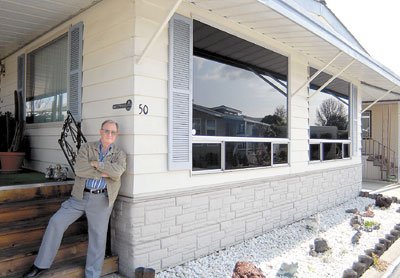Gilroy
– City officials have delayed a controversial plan to convert a
mobile home park into
”
condominiums
”
so they can see if the owner is unfairly keeping residents in
the dark.
Gilroy – City officials have delayed a controversial plan to convert a mobile home park into “condominiums” so they can see if the owner is unfairly keeping residents in the dark.
For more than a year, families living in the 178 units at Pacific Mobile Estates, at 500 W. 10th St., have complained about the costs associated with the land lying under their homes. The so-called “conversion” by owner Don Jurow does not require anyone to buy, but it does mean some residents could face rising monthly rents if they pass up the offer.
On Monday, nearly 100 residents from the mobile park flooded council chambers in City Hall to demand information about the sale price of the land, the homeowners association fees associated with the conversion, and other lingering issues.
Maureen Hunter, a 21-year resident, worried that she could be on the hook for hefty property taxes, insurance payments and other fees if she buys her property.
“They could screw me big time and I don’t want that to happen,” said Hunter, who proposed that she and other residents should only have to pay half of their current rents as a mortgage fee. Residents own their mobile units, but they must pay a monthly rent for the land underneath. With the conversion, they would own the land as well.
While some residents support the conversion, many residents and council members have taken issue with the lack of information about land prices.
Representatives for Jurow say they will not pay for costly appraisals until they receive city approval of the conversion.
“It’s like telling someone the price of the car after they agree to buy it,” Councilman Russ Valiquette said in an interview Thursday.
“I feel I’m being left in the dark,” he added. “I have a feeling that there’s a reason behind them not doing this first. I don’t think they want people to know up front how much it’s going to cost.”
Richard Close, an attorney representing Jurow, said that it’s standard practice for appraisals to take place after the conversion has been approved.
“I think they were raising a logical question of ‘How can people make decisions without knowing prices?’ which is a very valid question,” Close said. “The residents will have price information for at least six months prior to having to make decisions of whether they want to buy or rent.”
The most at-risk group under the conversion are people who do not qualify as low-income. State law prevents significant increases in rent on families below certain income levels, but no such protections apply to those who fail to meet the low-income threshold. Some residents worry that their rents, which for many are as low as $500 or $600 a month, could double or triple in a matter of three years if they choose not to buy.
Even residents such as Tony Mannino, a 46-year-old who favors the conversion, said he would like to see more information.
“Obviously we just want to know how much,” he said. “It’s difficult for people to decide, even though it’s better to be an owner. We need more information.
“However, it really is important to stress that they’re not forcing us to buy,” he added. “That’s what a lot of people get hung up on. It doesn’t really matter that we don’t know the price today … We are going to have plenty of time to arrange financing.”
Jurow plans to conduct appraisals after the city approves the conversion. Once those appraisals are mailed, residents will have at least six months from the time they receive it to decide whether or not they want to purchase their land. During that time, the land price will be locked in.
But city officials remain skeptical of arguments by Jurow’s representatives that appraisals are conducted after city approval. Reading state regulations governing the process, Councilmen Craig Gartman arrived at the conclusion that a tenant impact study – which includes an appraisal – must be completed prior to city review or approval.
Council voted unanimously Monday night to postpone a final decision on the proposal until a May 7 meeting. In weeks leading up the meeting, the city attorney will review requirements for provision of appraisals to tenants.
Despite delaying the conversion, council is handcuffed when it comes to denying the project. Mobile home conversions are closely regulated by state law, which limits the role of city officials to ensuring the conversion process is handled properly.
Valiquette acknowledged the council has only delayed the inevitable.
“I have a feeling that the majority of the council feels that we don’t like it,” he said, “but that’s what state law says, so we have to follow it.”














